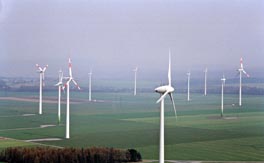Greening the Blue Report 2016
The United Nations emitted 2 million tonnes of carbon dioxide (CO2) equivalent in 2015, according to the organization's annual report of its greenhouse gas emissions. The latest edition of the Greening
The United Nations emitted 2 million tonnes of carbon dioxide (CO2) equivalent in 2015, according to the organization's annual report of its greenhouse gas emissions. The latest edition of the Greening
Climate and Trade Policies in a Post-2012 World is a collection of short forward-thinking articles by leading experts on the relationship between trade and climate change policies.

Large cuts in emissions of greenhouse gases are needed if we are to avoid the worst effects of global climate change. This rapid assessment report describes the vital contributions which ecosystems can and must make to improve these efforts.
Engagement between UNEP and civil society is necessary, both for UNEP and for the protection of the planet

This publication reviews changes in global forest cover and root causes of forest loss, including weak forest governance particularly in public-owned forests. It also highlights innovative practices in conserving forests and securing livelihoods of forest-dependent communities.
This report contains ideas and proposals on the elements contained in paragraph 1 of the Bali Action Plan, focusing on technology. It was originally submitted by UNEP to the UNFCCC in December 2008 as an input to the deliberations
This issues paper firstly analyzes the vicious spiral between climate change impacts, ecosystem degradation and increased risk of climate-related disasters; secondly, defines the central role of ecosystem management in climate change adaptation and disaster risk reduction and their multifaceted linkages; and thirdly, assesses the challenges for enhanced ecosystem management for climate change adap

Renewable sources accounted for 56 percent of investment dollars, worth $140 billion, while investment in fossil fuel technologies was $110 billion according to this new UN report. It highlights how investment in developing countries in 2008 had surged forward by 27 percent to $36.6 billion, and now accounted for nearly one third of global investments.
The river basins of South East Asia have been the subject of a number of studies shedding light on the complexity of their natural, political, social and economic issues. Although the diversity of these studies and reports serves as a knowledge base for the basins, one can rarely find a study that provides a holistic view of the water-related vulnerabilities in the basins.
Marine litter is a global concern affecting all the oceans of the world. It poses environmental, economic, health and aesthetic problems that are rooted in poor solid waste management practices, lack of infrastructure, indiscriminate human activities and behaviours and an inadequate understanding on the part of the public of the potential consequences of their actions.
This guide, while it aims to present the substance and the sense of the IPCC